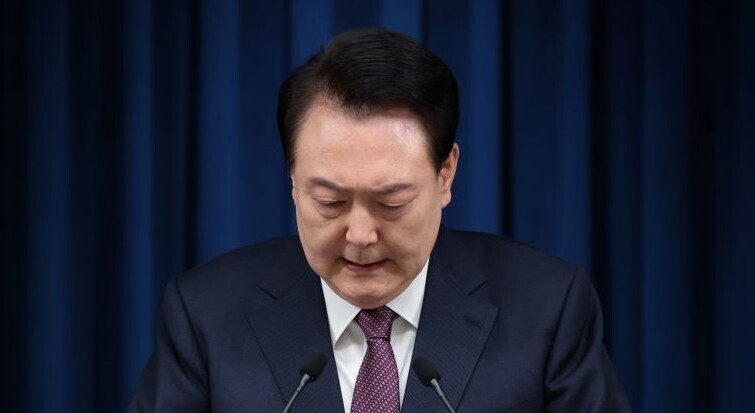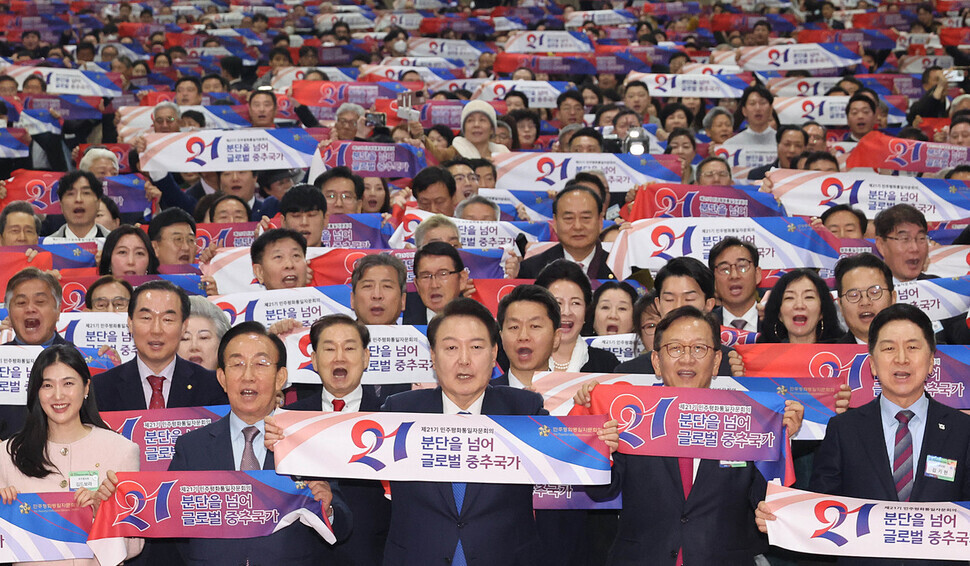hankyoreh
Links to other country sites 다른 나라 사이트 링크
Under Yoon, when it comes to Korean Peninsula issues, it’s everyone’s say but South Korea’s

On Nov. 27, the United Nations Security Council (UNSC) convened to discuss North Korea's recent launch of a military reconnaissance satellite. Leading the charge in criticizing the launch were South Korea, the United States, and Japan, while North Korea, China, and Russia stood in lockstep, pushing back against the condemnation. The session witnessed a volley of accusations and rebuttals and ultimately concluded without any definitive outcome, underscoring the present inability of the international community to curb North Korea’s defiance of UNSC resolutions.
Russia targets criticism at South, not NorthDespite this, the responses from China, the rotating president of the council for November, and Russia, which has been intensifying its military and security cooperation with North Korea in recent months, merit attention. That is because without the support of the US and Japan, South Korea might find it challenging to carve out diplomatic space should the Korean Peninsula re-enter a negotiation phase. Therefore, the understanding and cooperation of China and Russia are essential to kick-starting “peace diplomacy” on the Korean Peninsula.
At the meeting, China's deputy permanent representative to the UN, Geng Shuang, remarked, “No country can pursue its own absolute security at the expense of the security of others. If the DPRK constantly feels threatened [by the US], and its legitimate security concerns remain unresolved, the Peninsula will be unable to get out of the security dilemma.”
China has been reiterating its dual-track approach — simultaneous denuclearization and peace negotiations — a strategy it proposed in 2017 amid fears of a possible outbreak of war on the Korean Peninsula.
Russia’s deputy permanent representative to the UN, Anna Evstigneeva, went further by criticizing South Korea for its partial suspension of the inter-Korean military agreement of Sept. 19, 2018, in retaliation for North Korea's satellite launch. She suggested that “such steps could not but provoke a backlash,” and called upon the parties involved to “cease dangerous actions that might trigger an escalation into a large-scale conflict.” This criticism was notably directed at South Korea, not the North.
China’s and Russia's positions on the North Korean nuclear issue have been relatively consistent. However, as the Yoon Suk-yeol administration becomes more set on promoting a foreign policy strategy that favors the US and Japan, their tones have been increasingly critical. In other words, Yoon’s rash “values-based diplomacy” is pushing China and Russia more and more into the “enemy” camp. Multilateral diplomatic platforms readily reveal these diplomatic strains. Consider the Asia-Pacific Economic Cooperation (APEC) summit held in San Francisco from Nov. 15 to 17 as an example.
According to announcements from South Korea’s presidential office, Yoon's four-day US visit comprised three summit meetings with other heads of state. On the morning of Nov. 16, Yoon held summits with the leaders of Chile and Japan, and a meeting with the leader of Peru that afternoon. Notably, summits with the leaders of China and the US did not materialize. However, Yoon did briefly encounter Chinese President Xi Jinping for three minutes and met US President Joe Biden along with Japanese Prime Minister Fumio Kishida for a short ten-minute session for photos and greetings.

What about Biden's engagements? On Nov. 15, he had a four-hour lunch meeting with Xi, and the next morning, he met with Kishida for 15 minutes. Then, on Nov. 17, he held a summit with Mexican President Andrés Manuel López Obrador.
What could Biden and Kishida, in their separate meeting without Yoon, have discussed? According to a readout by the White House on Nov. 16, the two met “to discuss global and regional security issues and to advance bilateral security and economic cooperation” and “reaffirmed the importance of maintaining peace and stability in the Taiwan Strait, the Korean Peninsula, and the East and South China Seas.” It was also revealed that “the leaders also discussed their respective diplomacy with the People’s Republic of China and committed to continue close coordination.”
Japan's Ministry of Foreign Affairs, in a statement released the same day, highlighted that “Prime Minister Kishida also stated that the coordination between Japan and the US is becoming more important than ever with the situation in the Middle East, Ukraine, and the challenges of the Indo-Pacific region including China and North Korea.” It was also noted that “the two leaders, based on the results of the US-China summit meeting on the 15th, concurred on continuing to work closely together in addressing issues related to China.” This level of engagement stands in stark contrast to South Korea’s treatment.
Xi also had a busy few days. Following his summit with Biden on Nov. 15, he met with the leaders of Mexico, Peru and Fiji on the morning of Nov. 16. Later that day, he held summits with Brunei and Japan. Notably, despite tensions over Japan’s discharge of radioactively contaminated water from the Fukushima nuclear power plant, the China-Japan summit was notably lengthy, lasting 65 minutes.
According to China’s Foreign Minister, Xi “stressed that major issues of principle such as history and the Taiwan question are vital to the political foundation of China-Japan relations” and emphasized that “Japan must honor its commitment and ensure that the foundation of China-Japan relations is not damaged or shaken.” He further commented on the Fukushima issue, stating “that the discharge of Fukushima nuclear-contaminated water into the ocean concerns the health of all humanity, the global marine environment and the international common good. The Japanese side should take seriously the legitimate concerns in and outside Japan and properly handle the issue in a responsible and constructive manner.”
As for the Japanese side, its Foreign Ministry noted that the two leaders “reaffirmed” their commitment to “comprehensively promote a ‘mutually beneficial relationship based on common strategic interests,’” adding that they also discussed “international affairs, such as North Korea, including the abductions issue, the Middle East and Ukraine.” This follows a statement from the White House on Nov. 15, indicating that the leaders of the US and China discussed the denuclearization of the Korean Peninsula. In essence, this means that the US, China and Japan were exchanging their views on the Korean Peninsula issue without South Korea’s participation at all.
Will South Korea also compensate “comfort women” following payout to forced labor victims?The tense diplomatic atmosphere continued at a meeting held between the foreign ministers of South Korea, China and Japan in Busan on Nov. 26. Reports from the Chinese Foreign Ministry revealed that Foreign Minister Wang Yi, while meeting with his South Korean counterpart Park Jin, emphasized, “Both sides benefit from good bilateral relations and suffer otherwise,” adding that “the two sides should jointly resist the tendency of politicizing economic issues, instrumentalizing scientific and technological issues, and overstretching the concept of security of economic and trade issues.” Some observers interpret this as a warning against the Yoon administration’s diplomatic bias toward Washington.
Relations between South Korea and Japan, which had seen improvements in March 2023 following Seoul’s agreement to compensate the victims of forced labor by Japan, are again showing signs of strain. During a meeting with Park on the same day, Japanese Foreign Minister Yoko Kamikawa strongly protested the Seoul High Court’s Nov. 23 decision, which recognized Japan’s responsibility to compensate the victims of the “comfort women” system of sexual slavery, referring to it in terms of “breaches of international law.”
Park responded by reaffirming that the South Korean government “respects” the 2015 South Korea-Japan comfort women agreement as an official agreement between the two countries. This raises questions about whether the South Korean government will also assume responsibility for compensating the “comfort women” following a previous payout to the victims of forced labor by Japan. It seems Yoon’s foreign policy, which aims to elevate South Korea as a “global pivotal state,” may be encountering significant challenges.
By Jung In-hwan, staff reporter
Please direct questions or comments to [english@hani.co.kr]

Editorial・opinion
![[Column] Samsung’s ‘lost decade’ and Lee Jae-yong’s mismatched chopsticks [Column] Samsung’s ‘lost decade’ and Lee Jae-yong’s mismatched chopsticks](https://flexible.img.hani.co.kr/flexible/normal/500/300/imgdb/original/2024/0512/3017154788490114.jpg) [Column] Samsung’s ‘lost decade’ and Lee Jae-yong’s mismatched chopsticks
[Column] Samsung’s ‘lost decade’ and Lee Jae-yong’s mismatched chopsticks![[Correspondent’s column] The real reason the US is worried about Chinese ‘overcapacity’ [Correspondent’s column] The real reason the US is worried about Chinese ‘overcapacity’](https://flexible.img.hani.co.kr/flexible/normal/500/300/imgdb/original/2024/0510/5217153290112576.jpg) [Correspondent’s column] The real reason the US is worried about Chinese ‘overcapacity’
[Correspondent’s column] The real reason the US is worried about Chinese ‘overcapacity’- [Editorial] Yoon’s gesture at communication only highlights his reluctance to change
- [Editorial] Perilous stakes of Trump’s rhetoric around US troop pullout from Korea
- [Guest essay] Preventing Korean Peninsula from becoming front line of new cold war
- [Column] The state is back — but is it in business?
- [Column] Life on our Trisolaris
- [Editorial] Penalties for airing allegations against Korea’s first lady endanger free press
- [Editorial] Yoon must halt procurement of SM-3 interceptor missiles
- [Guest essay] Maybe Korea’s rapid population decline is an opportunity, not a crisis
Most viewed articles
- 1[Column] Samsung’s ‘lost decade’ and Lee Jae-yong’s mismatched chopsticks
- 2S.K.-Japan joint history project to be revived
- 3Yoon rejects calls for special counsel probes into Marine’s death, first lady in long-awaited presse
- 4Seoul’s plan to adopt SM-3 missiles is like wanting a sledgehammer to catch a fly
- 5With Naver’s inside director at Line gone, buyout negotiations appear to be well underway
- 6Korea poised to overtake Taiwan as world’s No. 2 chip producer by 2032
- 7S. Korean arrested and detained in Russia under espionage charges for first time in history, Moscow
- 8[Correspondent’s column] The real reason the US is worried about Chinese ‘overcapacity’
- 9[Korea travels] Korea’s best stargazing spots put the Milky Way almost in reach
- 10‘We must say no’: Seoul defense chief on Korean, USFK involvement in hypothetical Taiwan crisis